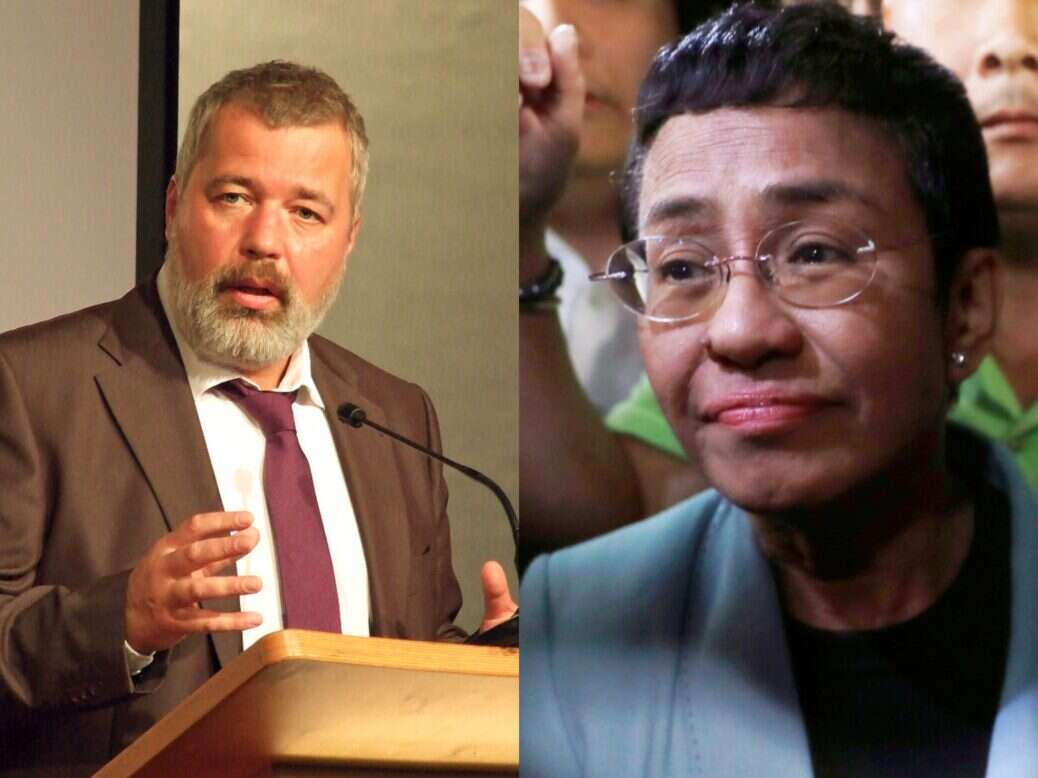
Two journalists have won the Nobel Peace Prize for their “courageous fight” for freedom of expression, in the Philippines and Russia respectively.
The respected award has been given to Maria Ressa, chief executive of Philippine digital media company Rappler, and Dmitry Muratov, founder and editor-in-chief of independent Russian Novaja Gazeta. Both are the first from their countries to receive the award, which is worth about $1.1m (£836,496).
Ressa has been subject to countless legal threats over her work, while Muratov has defended his newspaper’s right to report even as six of its journalists have been killed since its launch in 1993 while others have faced harassment, threats and violence.
The Nobel Peace Prize committee said the awards to Ressa and Muratov were “intended to underscore the importance of protecting and defending these fundamental rights”.
“Without freedom of expression and freedom of the press, it will be difficult to successfully promote fraternity between nations, disarmament and a better world order to succeed in our time,” it said.
The committee said Ressa, who co-founded Rappler in 2012, “uses freedom of expression to expose abuse of power, use of violence and growing authoritarianism in her native country”.
Rappler has reported critically on the Duterte administration, including its violent anti-drug campaign killing its own citizens, and has been a major player in the global fight against social media disinformation.
For years Ressa has been persecuted through the courts with charges ranging from cyber libel to tax fraud, all believed to be linked to efforts to stifle Rappler’s public interest journalism. In less than two years the Philippine government filed ten arrest warrants against her. She was jointly named Time magazine’s Person of the Year in 2018 for her “fearless” work in the face of such threats.
Ressa said: “It was pretty bleak at different times, but I really continued to believe that we need to continue shining the light. We need to continue doing accountability journalism.”
She added: “In order to do what we’re doing, Rappler lives with the possibility of a shutdown on a daily basis. We’re on quicksand. At the same time, if you keep the North star ahead of you, you keep the facts, you hold power to account.”
Ressa has written a book out next year, How To Stand Up To A Dictator, which examines “how democracy dies by a thousand cuts”. She is also a founding co-chair of the International Fund for Public Interest Media, which launched last month to supporting independent journalism around the world.
Muratov’s newspaper Novaja Gazeta has reported on subjects including corruption, police violence, unlawful arrests and electoral fraud in its 28 years with what the committee described as a “fundamentally critical attitude towards power”.
“The newspaper’s fact-based journalism and professional integrity have made it an important source of information on censurable aspects of Russian society rarely mentioned by other media.”
Despite the threats to the newspaper and its journalists under “increasingly challenging conditions”, Muratov has consistently defended the right to report independently as long as professional and ethical journalism standards are maintained.
Muratov intends to transfer part of the Nobel Prize to the Circle of Kindness Foundation, which helps children with serious and rare diseases.
The Nobel Committee said that as well as both journalists winning the prize due to their “courageous fight” for freedom of expression, they were also “representatives of all journalists who stand up for this ideal in a world in which democracy and freedom of the press face increasingly adverse conditions”.
Picture: Euku/Wikimedia and Reuters/Eloisa Lopez
Email pged@pressgazette.co.uk to point out mistakes, provide story tips or send in a letter for publication on our "Letters Page" blog
